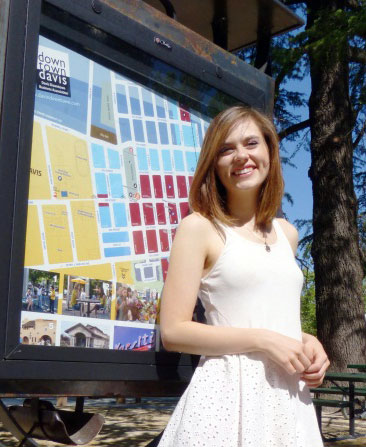Summer Sessions courses have been an important part of Lindsey Black’s successful UC Davis career, introducing her to life as an Aggie and allowing her to graduate in four years.
Introduction to Campus
Admitted as a transfer student in Fall 2011, Lindsey wanted to make the most of her two years on campus, and decided to dive in to UC Davis with a summer sessions course before officially starting her junior year. She found a sublet in town, got a summer job on campus, and enrolled in HIST 7C, Latin America, 1900-Present. The course was taught by an Associate Instructor whom Lindsey found very approachable and generous with her time. The experience gave her the confidence she needed to reach out to professors in the fall, and introduced her to the idea of going on to graduate study.
Taking a summer sessions course was a great way to get acquainted with campus resources and avoid the pitfalls of being a “new kid” in the fall (such as getting lost in the Death Star). One great discovery was Shields Library. At community college, Lindsey had relied mostly on online sources. The Shields staff introduced her to a wealth of new resources, and she discovered the pleasures of working in a library environment.
A Learning Community
Packing a full quarter’s worth of study into six weeks makes for an intensive experience which, for Lindsey, had positive results. Summer sessions students tend to have a strong sense of purpose. With the fast-paced, six-week schedule, she and her classmates were focused on their coursework, gathering outside of class for study and conversation, which created a vibrant learning community.
Another advantage of the intensive environment was that it helped her restructure her study habits. For students transferring from semester-based schools, the quarter system can be a shock. There’s no time to put off reading. The summer schedule required Lindsey to restructure her study habits, helping her adapt for the fall quarter.
Allowing Flexibility while Graduating in Four Years
Midway through her junior year, Lindsey changed her major, adding to her course requirements; she also planned to write a senior honors thesis. Faced with the choice of adding a fifth year or taking a course load which would negatively impact her GPA, she was grateful for the Summer Session option, and took two classes during the summer of 2012.
Because she was also working, she spread the courses out over two sessions. These upper-division history courses – HIS 178B, Race in America 1865-Present and HIS 141, France Since 1815 – were taught by associate instructors. One became a mentor to Lindsey, and they have continued to meet occasionally throughout the school year. The course syllabi included texts authored by UC Davis professors, which made her feel connected to those professors.
Advantages and Disadvantages
For Lindsey, the advantage of summer sessions courses have been many: an intensive environment which fostered an engaged leaning community and helped her adapt to the quarter system; the opportunity to get acquainted with the campus while the crowds are away; access to high-quality instructors who mentored her and helped her to explore the experience of graduate study; and allowing her to graduate on time while maintaining her strong GPA.
Were there any disadvantages? “The only disadvantage is that I never had a summer.” She has missed having the opportunity to spend time off with family in her home state of Texas. Lindsey will graduate this June, and in August will head for Japan as a teacher with the JET Program. Although this tireless student has already lined up a summer internship, she will telecommute from her home in Texas. Lindsey Black will finally have a well-deserved summer vacation.
About Summer Sessions
UC Davis Summer Sessions will run 6/24-8/2 (Session I) and 8/5-9/13 (session II). A rich selection of courses is available, including some unique summer offerings as well as popular courses that are waitlisted during the academic year -- such as STEM of Flight, an Introduction to Airplanes, Rockets and Satellites; Materials Properties; Nutrition Discoveries and Concepts (which can be taken remotely); and History of East Asian Civilization. Registration is open to the public.
For more information, including available courses and registration information, please visit the Summer Sessions home page, or call (530) 752-7611 or e-mail summer-sessions@ucdavis.edu.
For information about this article, e-mail scknox@ucdavis.edu.

